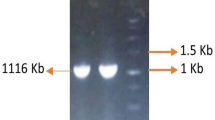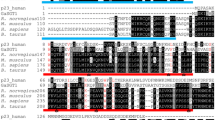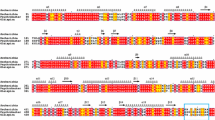Abstract
Shewanella sp. Ac10 is a psychrotrophic bacterium isolated from the Antarctica that actively grows at such low temperatures as 0°C. Immunoblot analyses showed that a heat-shock protein DnaK is inducibly formed by the bacterium at 24°C, which is much lower than the temperatures causing heat shock in mesophiles such as Escherichia coli. We found that the Shewanella DnaK (SheDnaK) shows much higher ATPase activity at low temperatures than the DnaK of E. coli (EcoDnaK): a characteristic of a cold-active enzyme. The recombinant SheDnaK gene supported neither the growth of a dnaK-null mutant of E. coli at 43°C nor λ phage propagation at an even lower temperature, 30°C. However, the recombinant SheDnaK gene enabled the E. coli mutant to grow at 15°C. This is the first report of a DnaK supporting the growth of a dnaK-null mutant at low temperatures.



Similar content being viewed by others
References
Alfano C, McMacken R (1989) Heat shock protein-mediated disassembly of nucleoprotein structures is required for the initiation of bacteriophage lambda DNA replication. J Biol Chem 264:10709–10718
Arsene F, Tomoyasu T, Bukau B (2000) The heat shock response of Escherichia coli. Int J Food Microbiol 55:3–9
Bukau B, Walker GC (1990) Mutations altering heat shock specific subunit of RNA polymerase suppress major cellular defects of E. coli mutants lacking the DnaK chaperone. EMBO J 9:4027–4036
Cowing DW, Bradwell JC, Craig EA, Woolford C, Hendrix RW, Gross CA (1985) Consensus sequence for Escherichia coli heat shock gene promoters. Proc Natl Acad Sci USA 82:2679–2683
Farr CD, Slepenkov SV, Witt SN (1998) Visualization of a slow, ATP-induced structural transition in the bacterial molecular chaperone DnaK. J Biol Chem 273:9744–9748
Ferrer M, Chernikova TN, Yakimov MM, Golyshin PN, Timmis KN (2003) Chaperonins govern growth of Escherichia coli at low temperatures. Nat Biotechnol 21:1266–1267
Heidelberg JF, Paulsen IT, Nelson KE, Gaidos EJ, Nelson WC, Read TD, Eisen JA, Seshadri R, Ward N, Methe B, Clayton RA, Meyer T, Tsapin A, Scott J, Beanan M, Brinkac L, Daugherty S, DeBoy RT, Dodson RJ, Durkin AS, Haft DH, Kolonay JF, Madupu R, Peterson JD, Umayam LA, White O, Wolf AM, Vamathevan J, Weidman J, Impraim M, Lee K, Berry K, Lee C, Mueller J, Khouri H, Gill J, Utterback TR, McDonald LA, Feldblyum TV, Smith HO, Venter JC, Nealson KH, Fraser CM (2002) Genome sequence of the dissimilatory metal ion-reducing bacterium Shewanella oneidensis. Nat Biotechnol 20:1118–1123
Kandror O, Goldberg AL (1997) Trigger factor is induced upon cold shock and enhances viability of Escherichia coli at low temperatures. Proc Natl Acad Sci USA 94:4978–4981
Kulakova L, Galkin A, Kurihara T, Yoshimura T, Esaki N (1999) Cold-active serine alkaline protease from the psychrotrophic bacterium Shewanella strain Ac10: gene cloning and enzyme purification and characterization. Appl Environ Microbiol 65:611–617
La Terza A, Papa G, Miceli C, Luporini P (2001) Divergence between two Antarctic species of the ciliate Euplotes, E. focardii and E. nobilii, in the expression of heat-shock protein 70 genes. Mol Ecol 10:1061–1067
Mayer MP (1995) A new set of useful cloning and expression vectors derived from pBlueScript. Gene 163:41–46
McCarty JS, Walker GC (1991) DnaK as a thermometer: threonine-199 is site of autophosphorylation and is critical for ATPase activity. Proc Natl Acad Sci USA 88:9513–9517
McCarty JS, Walker GC (1994) DnaK mutants defective in ATPase activity are defective in negative regulation of the heat shock response: expression of mutant DnaK proteins results in filamentation. J Bacteriol 176:764–780
Michelle LD, Kenneth W (1998) Heat shock response in psychrophilic and psychrotrophic yeast from Antarctica. Extremophiles 2:41–49
Mogk A, Bukau B, Lutz R, Schumann W (1999) Construction and analysis of hybrid Escherichia coli–Bacillus subtilis dnaK genes. J Bacteriol 181:1971–1974
Morita RY (1975) Psychrophilic bacteria. Microbiol Rev 39:144–167
Ohki M, Tamura F, Nishimura S, Uchida H (1986) Nucleotide sequence of the Escherichia coli dnaJ gene and purification of the gene product. J Biol Chem 261:1778–1781
Paciorek J, Kardys K, Lobacz B, Wolska KI (1997) Escherichia coli defects caused by null mutations in dnaK and dnaJ genes. Acta Microbiol Pol 46:7–17
Paek KH, Walker GC (1987) Escherichia coli dnaK null mutants are inviable at high temperature. J Bacteriol 169:283–290
Ratkowsky DA, Lowry RK, McMeekin TA, Stokes AN, Chandler RE (1983) Model for bacterial culture growth rate throughout the entire biokinetic temperature range. J Bacteriol 154:1222–1226
Sambrook J, Fritsch EF, Maniatis T (eds) (1989) Molecular cloning: a laboratory manual, 2nd edn. Cold Spring Harbor Laboratory, Cold Spring Harbor, pp 1.1–1.110
Slepenkov SV, Witt SN (1998) Peptide-induced conformational changes in the molecular chaperone DnaK. Biochemistry 37:16749–16756
Szabo A, Langer T, Schroder H, Flanagan J, Bukau B, Hartl FU (1994) The ATP hydrolysis-dependent reaction cycle of the Escherichia coli Hsp70 system DnaK, DnaJ, and GrpE. Proc Natl Acad Sci USA 91:10345–10349
Tomoyasu T, Ogura T, Tatsuta T, Bukau B (1998) Levels of DnaK and DnaJ provide tight control of heat shock gene expression and protein repair in Escherichia coli. Mol Microbiol 30:567–581
VanBogelen RA, Acton MA, Neidhardt FC (1987) Induction of the heat shock regulon does not produce thermotolerance in Escherichia coli. Genes Dev 1:525–531
Yoshimune K, Yoshimura T, Esaki N (1998) Hsc62, a new DnaK homologue of Escherichia coli. Biochem Biophys Res Commun 250:115–118
Yoshimune K, Yoshimura T, Nakayama T, Nishino T, Esaki N (2002) Hsc62, Hsc56, and GrpE, the third Hsp70 chaperone system of Escherichia coli. Biochem Biophys Res Commun 293:1389–1395
Zylicz M, Ang D, Liberek K, Georgopoulos C (1989) Initiation of lambda DNA replication with purified host- and bacteriophage-encoded proteins: the role of the dnaK, dnaJ and grpE heat shock proteins. EMBO J 8:1601–1608
Acknowledgements
This work was supported in part by the Grant-in-Aid for Scientific Research 09460049 (to N.E.), and Grant-in-Aid for Scientific Research on Priority Areas (B) 13125203 (to N.E.) from the Ministry of Education, Culture, Sports, Science, and Technology, and by the Pioneering Research Project (to T.Y.) in Biotechnology of the Ministry of Agriculture, Forestry, and Fisheries.
Author information
Authors and Affiliations
Corresponding author
Additional information
Communicated by K. Horikoshi
Rights and permissions
About this article
Cite this article
Yoshimune, K., Galkin, A., Kulakova, L. et al. Cold-active DnaK of an Antarctic psychrotroph Shewanella sp. Ac10 supporting the growth of dnaK-null mutant of Escherichia coli at cold temperatures. Extremophiles 9, 145–150 (2005). https://doi.org/10.1007/s00792-004-0429-9
Received:
Accepted:
Published:
Issue Date:
DOI: https://doi.org/10.1007/s00792-004-0429-9




